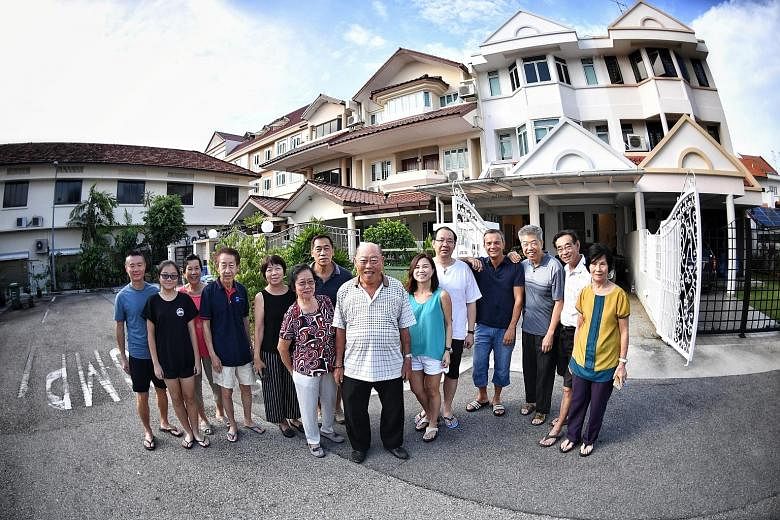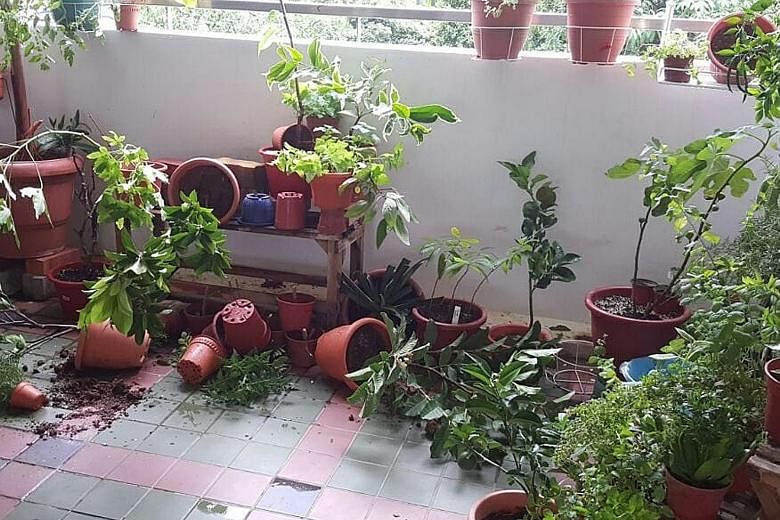Minutes after full-time national serviceman Lee Zhi Pheng, 22, left his HDB flat in Tampines one morning in June, he was in for a rude shock.
A WhatsApp message had come in from his mother, with a photo of his beloved potted plants along the corridor overturned and smashed.
He had left his house at 7.45am and, by 8am, his pots were smashed.
"It is like the guy was waiting for me to leave my house," he said. "I was disappointed, shocked. I didn't expect this kind of thing to happen."
"He stole one pot of lavender and lime. Some of my exotic mint species and fruiting plants were damaged. I collect more than 21 cultivars of mint and some can be really expensive," he told The Straits Times, adding that the total cost of the damage was about $200.
While he has asked the police to check the CCTV cameras, he hopes he can settle the matter privately.
Referring to the culprit, Mr Lee said: "I want to give him a chance to own up. After all, we are all plant lovers. If he is willing to pay the compensation I will let the matter rest."
Mr Lee has more than 300 potted plants of various sizes along the corridor along his fourth-floor HDB flat in Tampines. He said his neighbours on the same floor are "all okay with it... They love plants as well".
But for those with less tolerant neighbours, it is not hard to imagine how friction might arise.
Associate Professor Ho Kong Chong, from the department of sociology at the National University of Singapore, said neighbour disputes in Singapore - where so many live in high-rise environments - were "part and parcel of urban living", which is "dense and heterogeneous".
The most common neighbourly disputes here tend to be noise-related - making up 42 per cent of the disputes heard at the Community Mediation Centre last year. Others could involve abuse, harassment, excessive smell or smoke, and littering.
Prof Ho stressed that because the vast majority of Singaporeans live in HDB homes, the number of disputes in such neighbourhoods would naturally be higher.
Cultural differences between recent immigrants and Singaporeans could lead to misunderstandings, he said. For instance, some members of a focus group he runs knew of new migrants who would borrow their neighbours' slippers and umbrellas without asking, thinking "it was the neighbourly thing to do".
Still, he said: "We are not necessarily the friendliest people, but we are a country that accepts and respects ethnic differences."
While noise is a common cause of disputes in Housing Board estates, parking is often a bugbear in landed property areas. One famous dispute that reportedly began over parking space happened in Everitt Road. The spat, which started in 1993, involved seven families.
By the early 2000s, the row had escalated into a tit-for-tat war involving chains, video cameras and allegations of abuse. Mediation efforts failed, leading to police reports and court complaints. The conflict went on for years until the Chan family at the centre of it moved to nearby Joo Chiat Place in 2010.
Speaking to The Straits Times on a peaceful Saturday morning last week, Mrs Hannah Ee, who is in her 70s and has lived in Everitt Road since 1978, said: "It is now back to normal. You feel you can walk around everywhere, you have freedom now."
Today, neighbours old and new stay connected through a Whats- App group. Some are regular "drink kakis". And once a year, the neighbours throw a street party.
Such long-running spats are the exception rather than the norm - most disputes can be resolved through mediation. Residents who cannot resolve their issues on their own or with the help of grassroots leaders can approach the Community Mediation Centre, which aims to resolve disputes without litigation.
Last year, 285 cases mediated at the centre involved neighbourly disputes. This was more than half the total number of cases and consistent with previous years. About 79 per cent of these were resolved successfully.
But there is little the authorities can do if the parties do not want to make up or turn up for mediation.
The State Courts' Community Disputes Resolution Tribunals are seen as a "last resort".
Those who approach the tribunals are encouraged to first speak with their neighbour, or get help from their residents' committee, town council, National Environment Agency (NEA) or the police.
If these fail, they have to attend a pre-filing consultation session to understand the tribunal processes, the need for evidence, and non-litigious options they can explore, before starting proceedings.
Between July last year and June this year, 54 cases were filed at the tribunals - fewer than a third of the pre-filing consultations.
Even after contacting the authorities, matters may not be resolved immediately.
In May, ST reported that a woman in a Yishun HDB block had been splashing oil mixed with urine outside her neighbours' doors for more than a year. Clanging sounds also came from her unit every morning.
A neighbour erected a barrier barbed with cacti to keep her out, but the town council asked him to take it down as it was a fire hazard.
Sixth-floor resident Edmund Lee, 28, whose father built the barrier, said that while the woman - who was arrested but has been released - no longer bothers him, she has recently taken to pouring oil along the fourth-floor corridor.
The IT consultant has been in touch with the police and NEA, and said he is waiting for their reply.
Some have ironed out their issues with the help of a mediator.
Mr David Tan, 50, a self-described "peacemaker", has resolved four disputes in his private estate neighbourhood in Jalan Sinar Bulan, near The Changi Museum.
One in 2013 arose when a woman thought her neighbour - whose noisy renovations she complained about - had sent her poison-pen letters and damaged her car.
After hearing about it, Mr Tan invited both parties to his house and got them to let off steam over bowls of homemade soup. It turned out to be a misunderstanding, and the two are now good friends.
Mr Tan, vice-chairman of the Upper Changi Neighbourhood Committee, said most disputes are resolved by residents on their own. He said: "If people think not only for themselves, it would make the estate more comfortable to live in. It's not a one-person thing. Everyone must put in the effort."



